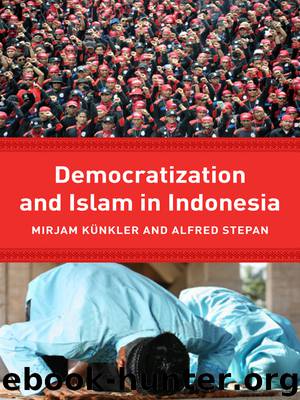Democracy and Islam in Indonesia by Künkler Mirjam; Stepan Alfred;

Author:Künkler, Mirjam; Stepan, Alfred;
Language: eng
Format: epub
Tags: REL037010, Religion/Islam/History, POL007000, Political Science/Political Ideologies/Democracy
Publisher: Columbia University Press
Published: 2013-09-09T16:00:00+00:00
Force
So far the story is a familiar and perhaps even comforting one: a democratizing regime tries to survive the wave of popular mobilization that accompanies its birth by granting concessions to popular and regional opinion that would have been inconceivable under its authoritarian predecessor. However, reforms were not the only factor resolving Indonesia’s crisis. Sidney Tarrow reminds us that Alexis de Tocqueville’s dictum, “The most perilous moment for a bad government is one when it seeks to mend its ways,” applied in the case of the former Soviet Union.22 In the Soviet Union, the government gave plenty of concessions, but these concessions tended to fuel the cycle of mobilization rather than to dampen it. Concessions encouraged previously passive groups to escalate their demands.
Why did such an outcome not occur in Indonesia? After all, in Indonesia, too, autonomy also failed to satisfy the regions that were on the leading edge of the cycle of separatist mobilization. East Timor was a special case: it was offered an independence referendum as an alternative to autonomy before the regional autonomy laws were even drafted; its political evolution followed a distinctive path. But the 1999 regional autonomy laws had no appreciable impact on reducing separatist sentiments in Papua and Aceh. Indeed, separatist mobilizations reached an all-time high shortly after these laws were passed. In November 1999, there was a massive demonstration (some estimated it involved half a million or more people) on the streets of Banda Aceh calling for an independence referendum, and before long the Gerakan Aceh Merdeka (GAM, Free Aceh Movement) insurgency controlled most of rural Aceh. In Papua in May–June 2000, the Papuan People’s Congress brought together delegates from many organizations and regions and passed a resolution that declared, “The people of Papua have been sovereign as a nation and a state since December 1, 1961.”23 The central government was so concerned about the strength of separatist sentiment in both places that in 2001 it granted both provinces special autonomy laws that went much further than the general autonomy laws. But these new laws also had little effect on separatist mobilization, with separatist leaders in both provinces angrily rejecting them and continuing to demand independence. Had their movements continued to grow and been successful, it is surely conceivable that the mobilization cycle would have restarted in the territories that had only toyed with independence in 1998–1999 and then been satisfied with decentralization.
The second lesson of Indonesia’s survival is therefore not so comforting for those who see the gradual emergence, in the words of a recent United Nations sponsored report, of a “war-averse world.”24 Indonesia’s leaders combined their policy of decentralization with ruthless military force and repression against those who threatened to secede. One compelling explanation for the collapse of the Soviet Union is that it experienced a dramatic loss of confidence at the center and that its leaders were, in the main, strikingly unwilling to use coercion against regional dissenters. According to one assessment, the “central element in Gorbachev’s modus operandi [was] an almost physical aversion to violence, political repression, and coercion.
Download
This site does not store any files on its server. We only index and link to content provided by other sites. Please contact the content providers to delete copyright contents if any and email us, we'll remove relevant links or contents immediately.
| Africa | Americas |
| Arctic & Antarctica | Asia |
| Australia & Oceania | Europe |
| Middle East | Russia |
| United States | World |
| Ancient Civilizations | Military |
| Historical Study & Educational Resources |
The Sympathizer by Viet Thanh Nguyen(4096)
The Rape of Nanking by Iris Chang(4024)
World without end by Ken Follett(3347)
Ants Among Elephants by Sujatha Gidla(3282)
Blood and Sand by Alex Von Tunzelmann(3060)
Japanese Design by Patricia J. Graham(3005)
City of Djinns: a year in Delhi by William Dalrymple(2437)
Foreign Devils on the Silk Road: The Search for the Lost Treasures of Central Asia by Peter Hopkirk(2389)
Inglorious Empire by Shashi Tharoor(2347)
The Queen of Nothing by Holly Black(2324)
In Order to Live: A North Korean Girl's Journey to Freedom by Yeonmi Park(2304)
India's Ancient Past by R.S. Sharma(2304)
Tokyo by Rob Goss(2295)
India's biggest cover-up by Dhar Anuj(2250)
Tokyo Geek's Guide: Manga, Anime, Gaming, Cosplay, Toys, Idols & More - The Ultimate Guide to Japan's Otaku Culture by Simone Gianni(2244)
The Great Game: On Secret Service in High Asia by Peter Hopkirk(2231)
Goodbye Madame Butterfly(2163)
Batik by Rudolf Smend(2010)
Living Silence in Burma by Christina Fink(1987)
